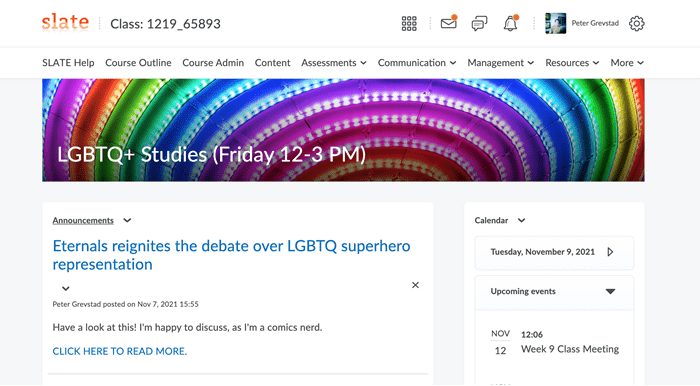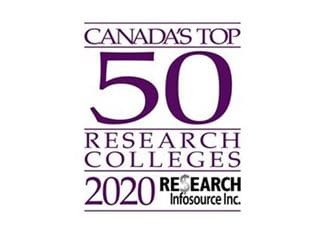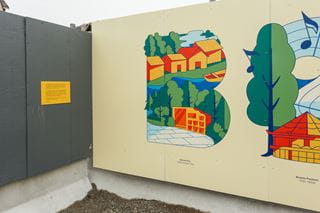
Growing the LGBTQ+ scholarly community to foster inclusivity on campus and beyond
 by Carolina Salcedo – Nov 16, 2021
by Carolina Salcedo – Nov 16, 2021 Peter Grevstad – a professor in Sheridan’s Faculty of Humanities and Social Sciences – has broken new ground with the introduction of a course in Queer Studies. It’s a first for Sheridan, and among the first and only of its kind taught at any college in Ontario.
Grevstad designed the course to uphold Sheridan’s high academic demands for degree breadth electives – courses offered to students pursuing four-year Bachelor’s degrees. His class challenges students to explore the work of Queer and gender-diverse authors and theorists like Jeanette Auger and Kate Krug, Barker & Scheele, Michel Foucault, Eve Kosofky-Sedgwick, Sandra Bem, Simone de Beauvoir, Judith Butler, as well as the work of other theorists, scientists and sexologists, whose work is most often found in graduate studies classrooms.
They also employ critical theory to write scholarly research papers, review queer films like Transamerica or Paris is Burning, write book reports, and produce podcasts on historical and contemporary queer heroes.
His class includes students who identify as queer and non-binary, gender-diverse and trans, as well as allies – all of whom are helping build a safe space for discussion, debate and support, within and beyond their virtual classroom.

As a scholar with a research focus on building supportive, community-minded campus climates, Grevstad identified a clear gap in the Ontario college sector when it came to queer studies.
He set out to develop a rigorous academic opportunity for LGBTQ+ students and allies at Sheridan, with a goal of building a diverse, supportive community of scholars in queer studies. The result, LGBTQ+ Studies, was first introduced in in Fall 2021.
“Research tells us that you can’t create an inclusive campus climate for LGBTQ+ students unless queerness is visible throughout the institution,” explains Grevstad. “That includes recognition and protection for queer community members, but it also means integrating queerness into curricula.”
Allowing queer and gender-diverse students to see themselves represented in their scholarly pursuits plays an immense role in validating their experiences and connecting them to a supportive community, says Grevstad.
He has clearly struck a chord with students. A week before the Fall term began, registration for the LGBTQ+ Studies course soared past its 80-student capacity limit, with multiple students waitlisted for a spot.
The reception to the course has been both inspiring and surprising for Grevstad. Despite the virtual setting, class discussion is peppered with reassuring comments and simple words of encouragement between peers. Two of the students help moderate a community on Discord that serves as a safe virtual queer space for further discussion and socialization. And to add a bit of fun, every class begins with a dance party.“Research tells us that you can’t create an inclusive campus climate for LGBTQ+ students unless queerness is visible throughout the institution. That includes recognition and protection for queer community members, but it also means integrating queerness into curricula.”
– Peter Grevstad
The students are also eager to learn more. Grevstad is regularly asked for additional readings by students who wish to continue exploring the domain of queer studies on their own. He believes this reflects the fact that many of these theories and stories have remained invisible to members of the queer community for too long.
“A lot of LGBTQ+ students have never had an opportunity to learn about themselves in education and see themselves represented in the material they study; a lot of our disciplines follow a very heteronormative narrative,” explains Grevstad. “These students want to be seen and want to explore stories like theirs.”
“Being introduced to Queer Theory in this class really opened my eyes to concepts I had only begun to think about or heard in passing,” attests Rick, a fourth-year student in the course “It has also helped me in my process of self-discovery.”
He adds that classes like Grevstad’s are important not only to build community, but to be able to have a safe space to learn and ask questions about these complex topics.
“I really enjoy the [LGBTQ+ Studies] class because I have a safe space where I know I won’t be judged for my sexuality or experiences,” adds Sarah, a fellow fourth-year student. “The community is expansive and very supportive.”
“Being introduced to Queer Theory in this class really opened my eyes to concepts I had only begun to think about or heard in passing, and has helped me in my process of self-discovery.”
– Rick, fourth-year student
Grevstad has been heartened by the students’ response to the course so far, and their enthusiasm to dig deeper into the material and build their own scholarly community. While Sheridan’s Queer Studies course was one of the very first at any college in the province, Grevstad hopes more will follow and expand representation for queer students and other diverse groups looking to see their experiences and perspectives reflected in the material they study.
“This course is just one step towards making our campuses climates and culture more inclusive to everyone,” he says. “But it’s through these little steps that inclusion and presence grow.”
Media Contact
For media inquiries, contact Sheridan’s Communications and Public Relations team.





